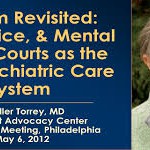Annual Report of AMHF November 1, 2022, to October 31, 2023. As of November 1, 2023, The American Mental Health Foundation has done outstanding work for 100 years. This is the Eleventh Annual Report of The American Mental Health Foundation, an association formed in 1924, incorporated in New York State in 1954. AMHF celebrates eleven decades […]
By:
Evander Lomke
Life is not fair in many circumstances. The serious mental illness of schizophrenia is one of those circumstances. No one likes being sick but the reality of schizophrenia is truly burdensome. Schizophrenia is a biologically rooted disease for which there are helpful treatments but no cure. One is born with this illness but it does […]
By:
Dr. Raymond B. Flannery Jr.

Now available just in time for the 2017 holidays and New Year, this fascinating book probes institutional life via 9 unforgettable profiles. In the words of its author, Dr. Henry Kellerman: “The unalloyed truth is that I’m in thrall to idiosyncrasy. It can be said that I actually love pathology. Let me explain: It’s that […]
By:
Evander Lomke

E. Fuller Torrey, M.D., says shame on the Substance Abuse and Mental Health Services Administration (SAMHSA), which operates under the Department of Health and Human Services (HHS). With a budget of $3.5 billion to reduce the burden of mental illness and substance abuse, SAMHSA has nonetheless never ascertained the prevalence (numbers afflicted) of schizophrenia and bipolar disorder. […]
By:
Evander Lomke

“A delusion is a belief held with strong conviction despite superior evidence to the contrary. As a pathology, it is distinct from a belief based on false or incomplete information, confabulation, dogma, illusion, or other effects of perception. Delusions typically occur in the context of neurological or mental illness, although they are not tied to […]
By:
Evander Lomke

Facts: Pornography causes problems socially and individually; pornography cuts against Christian (and most religious) teaching; pornography is demeaning; pornography victimizes women or whoever is depicted. Pornography might properly be described as unfit for consumption…by anyone. Might the title of this blog be “When Your Wife Is a Pornography Addict?” or “When Your Husband Is a […]
By:
Evander Lomke

Dateline: Anywhere, Any Time The voice in Daniel’s head kept saying “The nurse is trying to kill you. The nurse is trying to kill you. The nurse is trying to kill you.” Daniel, a twenty-two-year-old patient with schizophrenic illness, became very frightened, then terrified, then explosively angry. “Time for medicines. Patients please come to the […]
By:
Dr. Raymond B. Flannery Jr.

One of the world’s largest publishing houses was named by co-founder Bennett Cerf Random House. The name describes the true nature of trade-book publishing. (In fact, one publisher goes one better, calling itself Serendipity Press.) It is an interesting word: Random. Many of a philosophic or theological disposition believe nothing in life occurs randomly: that […]
By:
Evander Lomke

This is the final blog in the AMHF series of twenty-one films relating to “Hollywood and Psychiatry.” These blogs have taken us from ca. 1921, and the release of silent classic The Cabinet of Dr. Caligari, a mere three years before The American Mental Health Foundation was organized, into the twenty-first century. The first blog […]
By:
Evander Lomke

This is film number twenty of twenty-one in the AMHF series, focusing on a range of Hollywood depictions of psychiatry, analysts, and individuals under analysis, from the silent era to the present. (The final film for discussion, an updated version of The Bell Jar, will be included as a kind of “what may be” assuming […]
By:
Evander Lomke

On our AMHF blogs we have tried to feature information about where the Venn diagrams of spirituality and counseling intersect. It seems peculiar that many religious people–from many religions–are reticent to link the spiritual resources and traditions of their faith with modern psychology and psychiatry. When people are depressed, psychotic, or anxious, there is a […]
By:
William Van Ornum, Ph.D.

For three days last week American Mental Health Foundation Books shared a booth with its distributor, Lantern, at the annual BookExpo America—which is held at the Jacob Javits Center on New York City’s West Side. (New York remains the publishing capital of North America, even with the multitude of changes the industry has seen.) The […]
By:
William Van Ornum, Ph.D.

A feature story in today’s Washington Post, written by Stephanie McCrummen, offers an intensive look at the week of a 19-year-old man who, two years ago, was diagnosed with paranoid schizophrenia. It is the story of Spencer Haskell, and of his mom, Naomi, who has taken on the task of monitoring her son and making […]
By:
William Van Ornum, Ph.D.

This is the first weekend showing of a movie that filmgoers and literary lions alike have been waiting for: The Great Gatsby. Everyone and everything is enmeshed. There are affairs. Grand parties throw people who would not normally meet each other together. The excesses of the Jazz Age coexist with the growing economic conditions that […]
By:
William Van Ornum, Ph.D.

Newly minted pastor Ed Stetzer, writing in CNN.beliefnet, writes of his dealings with a man in his congregation. This person would often disappear for days at a time, and later Stetzer would hear that the fellow had spent hours praying the psalms. Later the man killed himself, leading Stetzer to reflect of aproaches churches could […]
By:
William Van Ornum, Ph.D.

Once known as Multiple Personality Disorder (MPD), Dissociative Identity Disorder (DID) is the subject of film number eighteen of twenty-one in the AMHF series on psychiatry in Hollywood. The Three Faces of Eve covers a most controversial disorder—often outright debunked as the current (as of this writing) DSM-4 had made significant changes to the diagnosis. […]
By:
Evander Lomke

As Edward R. Murrow said, there are two sides to every story. Our previous probing into an increase and acceleration in funding for research into the brain waxed positively. A different viewpoint—now taken by major pharmaceutical industries—suggests that their interest in brain research is waning. Reuters reports the following: “Many pharmaceutical companies harbor deep doubts […]
By:
William Van Ornum, Ph.D.

President Barack Obama made headlines with his proposal to encourage American scientists to work toward understanding the great mysteries of the brain. Done as a massive project, this could rival past collective enterprises such as Getting a Man to the Moon; when President Kennedy suggested this, it took everyone’s breath away. It looked unattainable in […]
By:
William Van Ornum, Ph.D.

Several weeks ago Evander, as part of the series of films on mental health, posted a review of Fear Strikes Out. This unique story–coming out mid-point in outfielder Jimmy Piersall’s career—highlights Piersall’s emotional problems and strange behaviors: talking to Babe Ruth’s statue in the Yankee Stadium outfield, squirting home plate with a water pistol so […]
By:
William Van Ornum, Ph.D.

Consumers of mental-health services may not realize the extensive system of codes that go into insurance billing and medical records, both for mental-health services and other medical services. For mental health, every person who receives insurance reimbursement receives a diagnostic code from the most current Diagnostic and Statistical Manual of the American Psychiatric Association, as […]
By:
William Van Ornum, Ph.D.

Previously I’ve written about Recovery International, founded by psychiatrist Abraham Low in the 1940s in Chicago, Illinois. Dr. Low initiated a revolutionary brand of treatment that we now call cognitive therapy: by changing one’s thoughts, one could change troublesome feelings and through practice attain better mental health. Dr. Low used the word apprenticeship to denote […]
By:
William Van Ornum, Ph.D.

Edward Hallowell and John Ratey have published a follow-up to their successful book Driven to Distraction. On a hopeful note, it is titled Delivered from Distraction. The first book was written in the 1990s. It contains much good advice on ADHD: diagnosis, medications, telling it apart from other conditions as well as finding it in […]
By:
William Van Ornum, Ph.D.

Big Brothers Big Sisters is a national organization which matches volunteers to children who could use a supportive adult in their life. Children in foster care, in single parent families, children with an incapacitating illness–are the kinds of youngsters who might be given priority status. The sponsoring agency has been known to do a careful […]
By:
William Van Ornum, Ph.D.

One of my favorite television persons–Jane Pauley–experiences bipolar disorder and has written about it in the book Skywriting: A Life Out of the Blue . Here is her description of one of her episodes: “My husband, Garry, was becoming concerned. When I started talking about my own line of clothing, his concern upgraded to alarm. […]
By:
William Van Ornum, Ph.D.

Too many times we view medication and psychological therapies as either/or treatments. Many times people will try to avoid any medication for even a severe mental health problem. Their reasons are always worth noting: perhaps there is a realistic fear of side effects, or a desire to work things out in a trusting relationship. Perhaps […]
By:
William Van Ornum, Ph.D.

Friends at the International Bipolar Foundation are sponsoring an important lecture on June 14, 2002. If you live near San Diego you might consider attending. For others, the lecture will be archived on the Web site…. Join us Thursday, June 14, for our free monthly mental health lecture with guest speaker Dr. Lisa Eyler. Dr. […]
By:
William Van Ornum, Ph.D.

The Individuals with Disabilities Act (IDEA) lists conditions present in a child that can qualify him or her for special services in the educational system in preschool. These are: *Chromosomal Abnormalities (e.g., Down syndrome) *Syndromes (e.g., fetal alcohol syndrome) *Neuromuscular Disorder (e.g., cerebral palsy, spina bifida) *Central nervous system (CNS) abnormality (e.g., caused by bacterial/viral […]
By:
William Van Ornum, Ph.D.
The American Psychological Association has announced, in the January 2012 issue of American Psychologist, “Guidelines for Assessment of and Intervention With Persons of Disabilities.” This document lists twenty-two practice-guidelines for psychologists who work with persons displaying disabilities of various kinds. The task force for this report was chaired by Kurt F. Geisinger of the University […]
By:
William Van Ornum, Ph.D.

In the recent yearly “Reports of the Association” issue of the American Psychologist (December 2011), the American Psychological Association announced “Practice Guidelines Regarding Psychologists’ Involvement in Pharmacological Issues.” This report notes several factors that will make psychologists more involved in medication-management issues. One survey noted that the number of Americans using antidepressants increased from 6.7 […]
By:
William Van Ornum, Ph.D.

Ann Carrns, writing in the January 11, 2012, New York Times, notes a new financial tool, one geared for families with individuals who have special needs: “Families with children who have special needs or disabilities face even bigger hurdles than most people when it comes to planning for their financial futures. Merrill Lynch Wealth Management […]
By:
William Van Ornum, Ph.D.
1
2
Next »



































 Host Companion
Host Companion